Hyundai Mobis Bundle
Who Really Owns Hyundai Mobis?
Understanding the ownership structure of Hyundai Mobis is crucial for anyone looking to navigate the complexities of the automotive industry. From its humble beginnings as a subsidiary, this Korean company has evolved into a global powerhouse. Unraveling the details of Hyundai Mobis SWOT Analysis, including its key stakeholders and their influence, is essential for grasping its strategic direction.
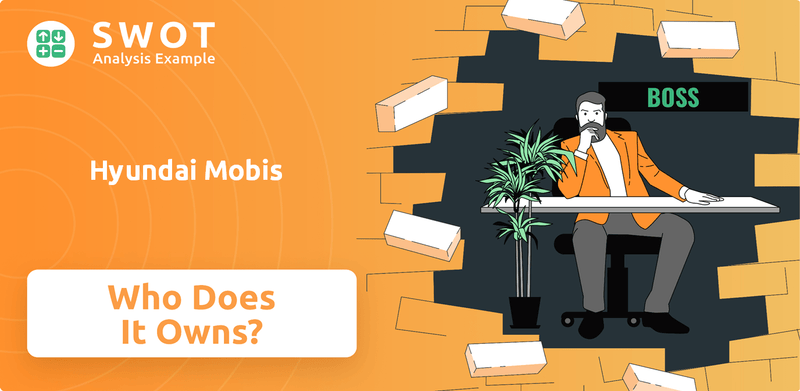
Hyundai Mobis, a core supplier within the Hyundai Motor Group, boasts a substantial market position, generating billions in revenue. The evolution of Mobis ownership, from its founding to its current status, reflects its growth and strategic alignment within the automotive sector. This analysis will provide a comprehensive overview of who controls this influential player, including an examination of its relationship with Hyundai Motor Company and its subsidiaries.
Who Founded Hyundai Mobis?
The origins of Hyundai Mobis trace back to 1977, when it was established as Hyundai Precision & Industries Corporation. This entity was a subsidiary of the Hyundai Motor Group, a significant conglomerate in South Korea. The initial focus was on manufacturing automotive parts and components.
The founder of the Hyundai Motor Group, Chung Ju-yung, played a pivotal role in establishing the company. While specific details on individual founder equity splits are not readily available in public records, the company's early ownership was closely tied to the broader Hyundai Motor Group.
Chung Mong-koo, son of Chung Ju-yung, held his first managerial position at Hyundai Precision Industry and served as its first CEO. The company's early focus was on supporting the burgeoning automotive production of the Hyundai Motor Group.
Initially, the company concentrated on producing automotive parts and components. This included items such as containers and H-beams.
In 1999, the company was renamed Hyundai Mobis. This change reflected a strategic shift towards mobility solutions and a greater emphasis on automotive parts manufacturing and supply.
The company quickly gained recognition for its products and technologies. It became a key player within the automotive sector.
Early agreements or disputes regarding ownership are not widely detailed in public information. The foundational vision supported the growth of Hyundai Motor Group's automotive production.
The company's early products included automotive parts and components, as well as containers and H-beams.
The primary focus was on manufacturing automotive parts to support the Hyundai Motor Group's vehicle production.
Understanding the Mobis ownership structure is crucial for investors and stakeholders. The company's history is intertwined with the Hyundai Motor Group. The early ownership was closely linked to the Hyundai Motor Group, with Chung Ju-yung's vision guiding its establishment. The company's evolution reflects strategic shifts within the automotive industry. As of recent reports, key shareholders include Hyundai Motor Company and related entities. The exact percentage of ownership can fluctuate. The company's focus on automotive parts and its relationship with Hyundai Motor Company remain central to its operations. The company's financial performance, including revenue and market share, is a key indicator of its success.
- The company was founded in 1977 as Hyundai Precision & Industries Corporation.
- The initial focus was on manufacturing automotive parts and components.
- Chung Mong-koo, son of Chung Ju-yung, was the first CEO.
- The company was renamed Hyundai Mobis in 1999.
Hyundai Mobis SWOT Analysis
- Complete SWOT Breakdown
- Fully Customizable
- Editable in Excel & Word
- Professional Formatting
- Investor-Ready Format
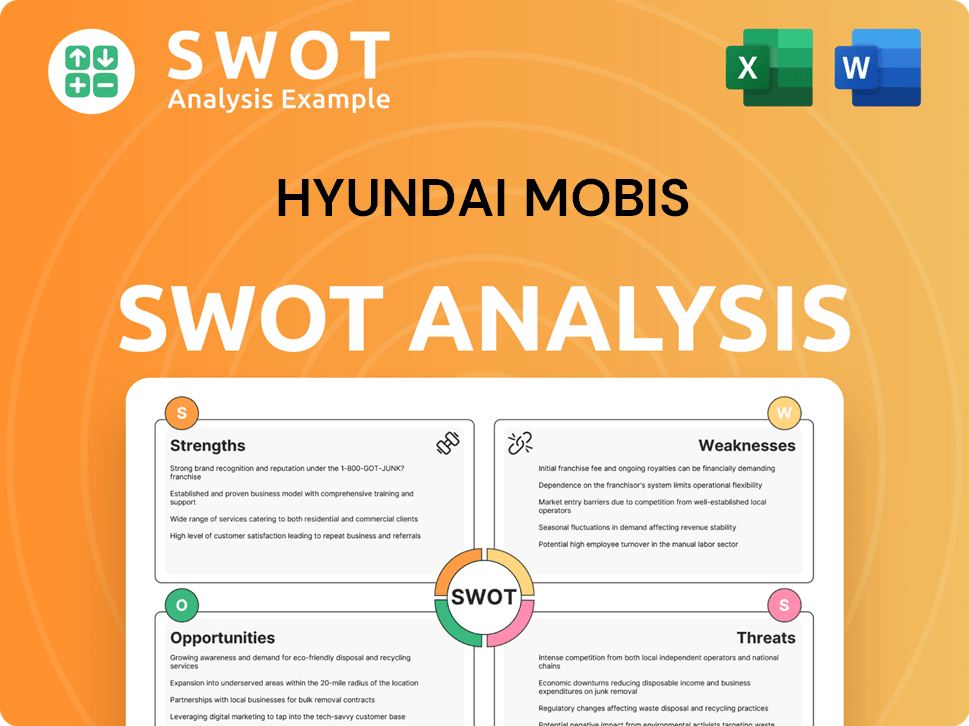
How Has Hyundai Mobis’s Ownership Changed Over Time?
The ownership structure of Hyundai Mobis, a prominent Korean company in the automotive parts sector, has been shaped by its integration within the Hyundai Motor Group and its status as a publicly traded entity. The evolution of Mobis ownership reflects strategic shifts and the influence of key stakeholders. Understanding Revenue Streams & Business Model of Hyundai Mobis is crucial to grasp how ownership impacts its operations.
As of December 31, 2024, major shareholders included Kia Motors Corporation with 17.54%, Chung Mong-koo with 7.24%, and Hyundai Steel Co., Ltd. with 5.88%. More recent data from April 9, 2025, shows some changes: Kia Corporation held 17.66%, the National Pension Service held 8.62%, Chung Mong-koo held 7.29%, Hyundai Steel held 5.92%, Mirae Asset Financial Group held 5.20%, and Treasury stock held 3.64%. These shifts highlight the dynamic nature of Mobis ownership and the influence of various institutional and individual investors.
| Shareholder | Percentage (April 9, 2025) | Notes |
|---|---|---|
| Kia Corporation | 17.66% | Key strategic partner within Hyundai Motor Group |
| National Pension Service | 8.62% | Significant institutional investor |
| Chung Mong-koo | 7.29% | Influential individual shareholder |
| Hyundai Steel | 5.92% | Affiliated company |
| Mirae Asset Financial Group | 5.20% | Institutional investor |
Hyundai Mobis also holds a significant stake in other Hyundai Motor Group entities. As of March 31, 2025, it held the largest stake in Hyundai Motor Company, with 45,782,023 shares, representing 21.86%. This inter-company ownership structure underscores the interconnectedness within the group, where Mobis plays a central role in the automotive parts supply chain. Such cross-ownership arrangements often reflect strategic decisions aimed at streamlining operations or enhancing governance within the conglomerate.
The ownership of Hyundai Mobis is primarily influenced by its parent company, Kia Corporation, and key individuals within the Chung family.
- Kia Corporation is the largest shareholder.
- The National Pension Service and other institutional investors hold significant stakes.
- Hyundai Mobis's ownership structure reflects its strategic importance within the Hyundai Motor Group.
- Changes in shareholding can indicate strategic shifts and governance enhancements.
Hyundai Mobis PESTLE Analysis
- Covers All 6 PESTLE Categories
- No Research Needed – Save Hours of Work
- Built by Experts, Trusted by Consultants
- Instant Download, Ready to Use
- 100% Editable, Fully Customizable
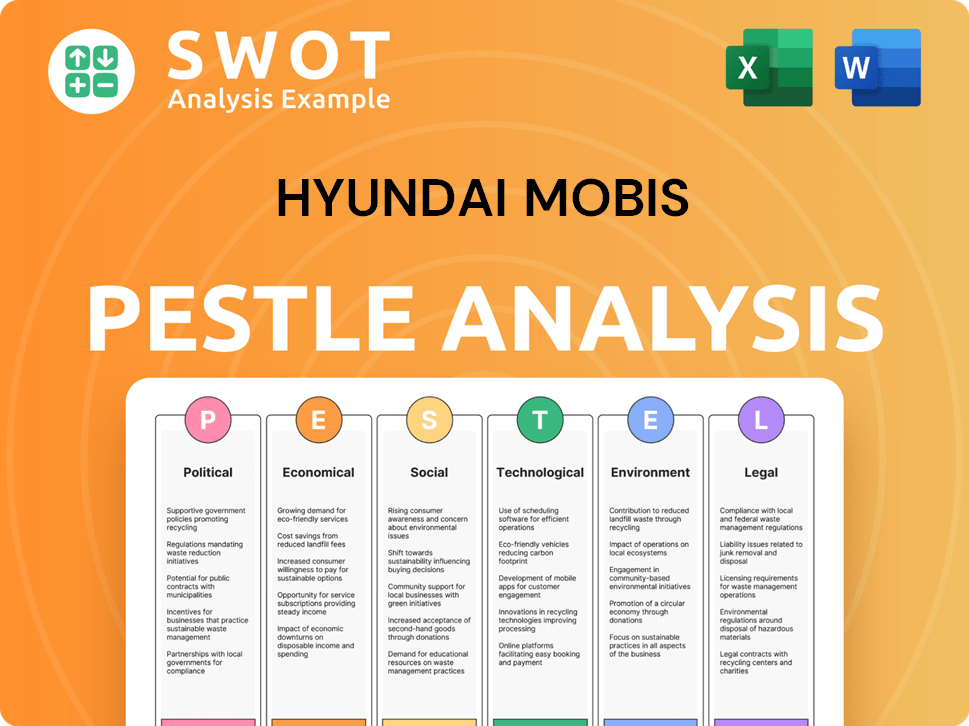
Who Sits on Hyundai Mobis’s Board?
The current board of directors of Hyundai Mobis guides the company's operations. While specific details about all board members and their affiliations for late 2024-2025 are not fully available in the search results, some key figures are known. For instance, as of March 2023, James Kim, chairman of the American Chamber of Commerce in Korea (AMCHAM), joined as an outside director, bringing expertise in business management, particularly in mobility and software. Chung Euisun, Chairman of Hyundai Motor Group, has also been reappointed as an internal director. Other external directors, including Chang Young, former head of UBS Securities Seoul, were expected to remain.
The board's composition reflects a focus on diversity, expertise, and independence. The company aims to incorporate shareholder feedback in its policies and enhance shareholder value. This approach is a response to investor expectations regarding governance and returns. The board's structure and activities are crucial for the company's strategic direction and financial performance.
| Board Member | Role | Affiliation |
|---|---|---|
| James Kim | Outside Director | Chairman of AMCHAM |
| Chung Euisun | Internal Director | Chairman of Hyundai Motor Group |
| Chang Young | Outside Director | Former head of UBS Securities Seoul |
The voting structure at Hyundai Mobis generally follows a one-share-one-vote principle. There is no indication of special voting rights or shares that grant outsized control beyond direct shareholding. The company's emphasis on shareholder value and a diverse, expert board suggests a stable governance environment. This structure is typical for publicly traded companies. The focus on shareholder value is also a key aspect of the company's strategy.
The board includes members with diverse expertise, including business management and financial backgrounds.
- Emphasis on shareholder value and independent board members.
- Voting follows a one-share-one-vote principle.
- Focus on incorporating shareholder feedback.
- Relatively stable governance environment.
Hyundai Mobis Business Model Canvas
- Complete 9-Block Business Model Canvas
- Effortlessly Communicate Your Business Strategy
- Investor-Ready BMC Format
- 100% Editable and Customizable
- Clear and Structured Layout
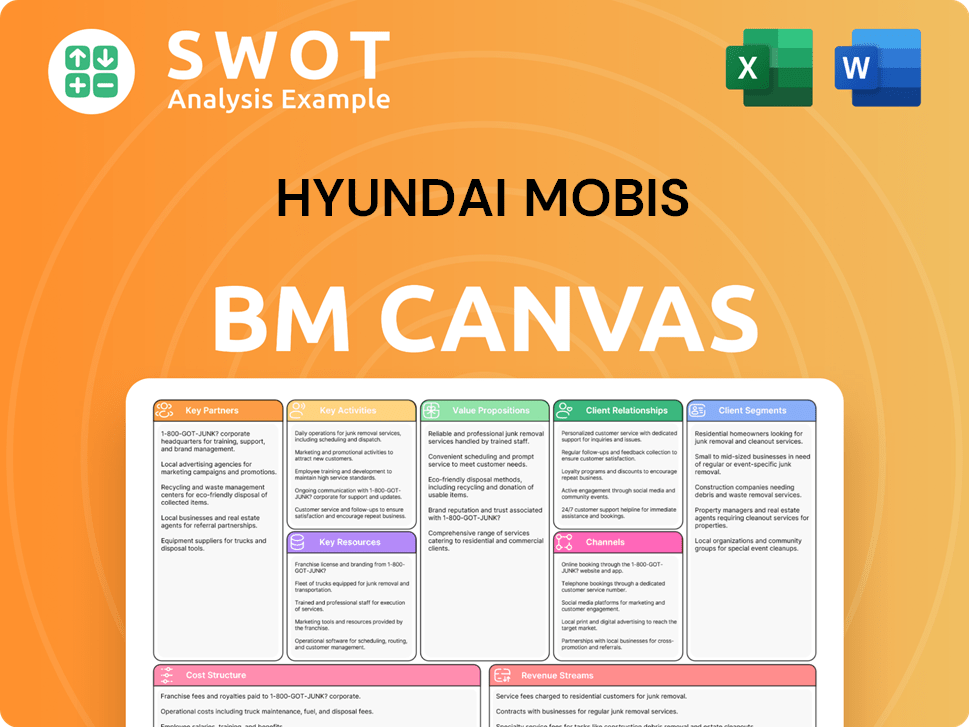
What Recent Changes Have Shaped Hyundai Mobis’s Ownership Landscape?
Over the past few years, Hyundai Mobis, a prominent Korean company in the automotive parts sector, has prioritized enhancing shareholder value. This focus is evident in its strategic investments and shareholder return policies. In November 2024, Hyundai Mobis unveiled a mid-to-long-term shareholder return policy for 2025-2027, targeting a total shareholder return (TSR) of 30% or more. This policy includes plans for flexible cash dividends and share buybacks/cancellations, directly influencing the Mobis ownership structure.
Specifically, the company announced plans for two rounds of share buybacks in 2025. The first round, to be discussed at a board meeting in February 2025, is expected to be twice the size of the 2024 buyback (W163 billion). The second round will occur in the second half of 2025, coupled with the retirement of repurchased shares. In February 2025, Hyundai Mobis authorized a buyback plan for 1,200,000 shares, representing 1.33% for KRW 304,493.56 million, which closed in May 2025. These actions reflect a commitment to managing capital and boosting shareholder returns.
| Metric | Details | Year |
|---|---|---|
| Share Buyback (Round 1) | Expected to be twice the size of the 2024 buyback | 2025 |
| Share Buyback (Round 2) | To occur in the second half of 2025, shares retired | 2025 |
| Buyback Plan | 1,200,000 shares repurchased | May 2025 |
| Buyback Value | KRW 304,493.56 million | May 2025 |
In terms of strategic investments, Hyundai Mobis is investing significantly in future growth drivers such as auto chips, robotics, and urban air mobility. These investments are part of a broader strategy to expand its global customer base beyond Hyundai and Kia, aiming to increase the share of global customers in its core parts sales from 10% to 40% by 2033. While no major mergers and acquisitions directly impacting its ownership structure have been explicitly detailed in the recent period, these strategic investments and buyback programs indicate a proactive approach to managing capital and enhancing shareholder returns.
The policy aims for a total shareholder return (TSR) of 30% or more from 2025 to 2027.
Significant investments in auto chips, robotics, and urban air mobility are planned.
Two rounds of share buybacks are scheduled for 2025.
The goal is to increase the share of global customers in core parts sales to 40% by 2033.
Hyundai Mobis Porter's Five Forces Analysis
- Covers All 5 Competitive Forces in Detail
- Structured for Consultants, Students, and Founders
- 100% Editable in Microsoft Word & Excel
- Instant Digital Download – Use Immediately
- Compatible with Mac & PC – Fully Unlocked
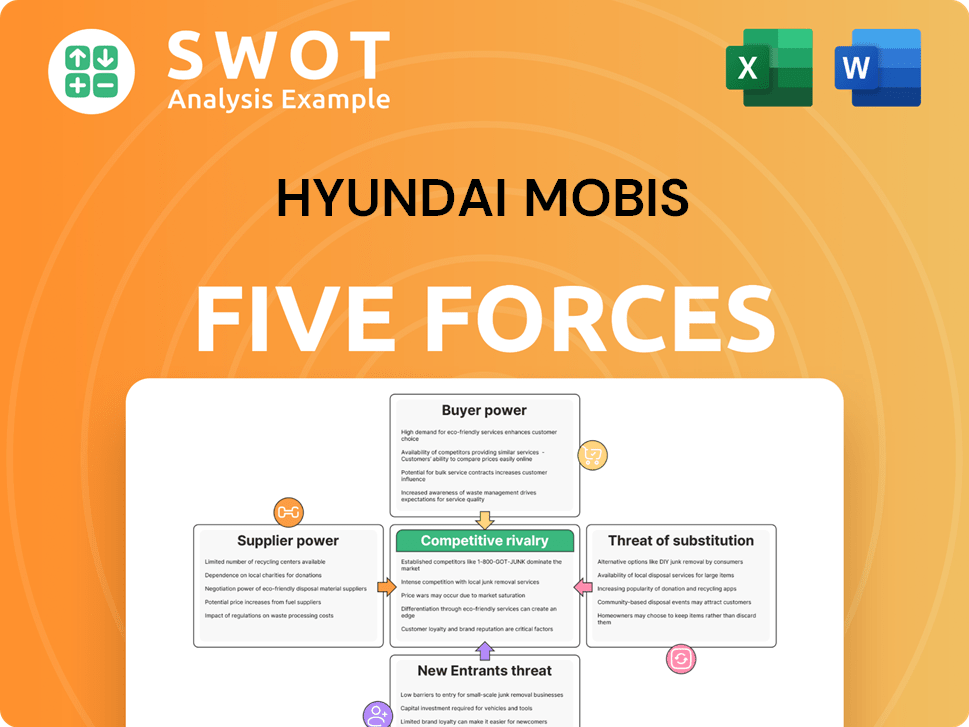
Related Blogs
- What are Mission Vision & Core Values of Hyundai Mobis Company?
- What is Competitive Landscape of Hyundai Mobis Company?
- What is Growth Strategy and Future Prospects of Hyundai Mobis Company?
- How Does Hyundai Mobis Company Work?
- What is Sales and Marketing Strategy of Hyundai Mobis Company?
- What is Brief History of Hyundai Mobis Company?
- What is Customer Demographics and Target Market of Hyundai Mobis Company?
Disclaimer
All information, articles, and product details provided on this website are for general informational and educational purposes only. We do not claim any ownership over, nor do we intend to infringe upon, any trademarks, copyrights, logos, brand names, or other intellectual property mentioned or depicted on this site. Such intellectual property remains the property of its respective owners, and any references here are made solely for identification or informational purposes, without implying any affiliation, endorsement, or partnership.
We make no representations or warranties, express or implied, regarding the accuracy, completeness, or suitability of any content or products presented. Nothing on this website should be construed as legal, tax, investment, financial, medical, or other professional advice. In addition, no part of this site—including articles or product references—constitutes a solicitation, recommendation, endorsement, advertisement, or offer to buy or sell any securities, franchises, or other financial instruments, particularly in jurisdictions where such activity would be unlawful.
All content is of a general nature and may not address the specific circumstances of any individual or entity. It is not a substitute for professional advice or services. Any actions you take based on the information provided here are strictly at your own risk. You accept full responsibility for any decisions or outcomes arising from your use of this website and agree to release us from any liability in connection with your use of, or reliance upon, the content or products found herein.